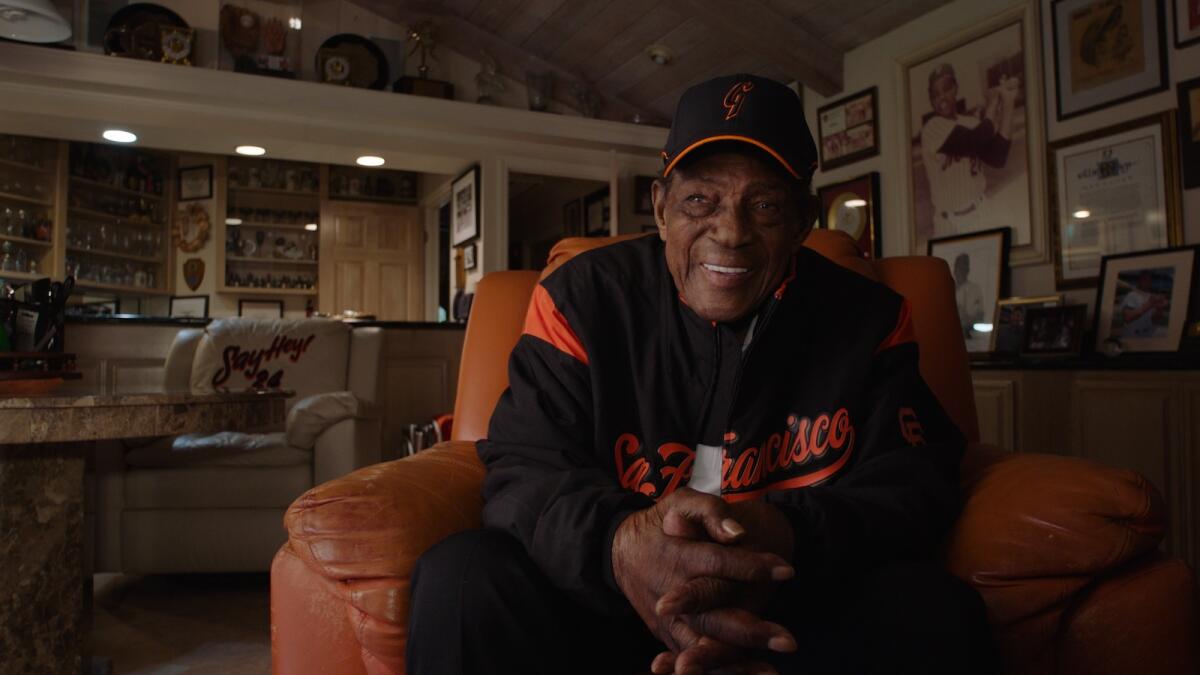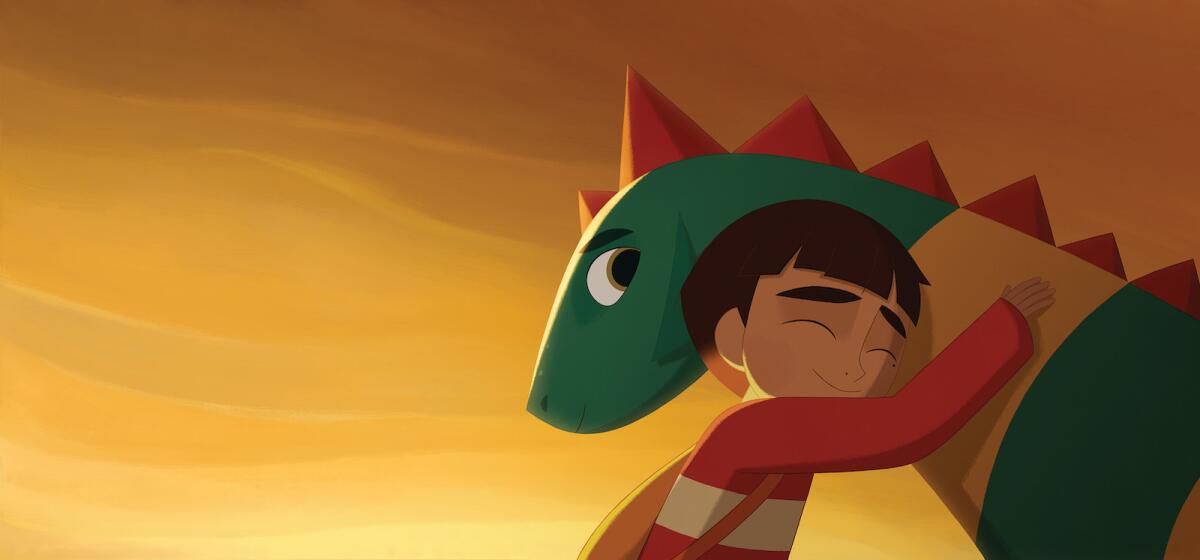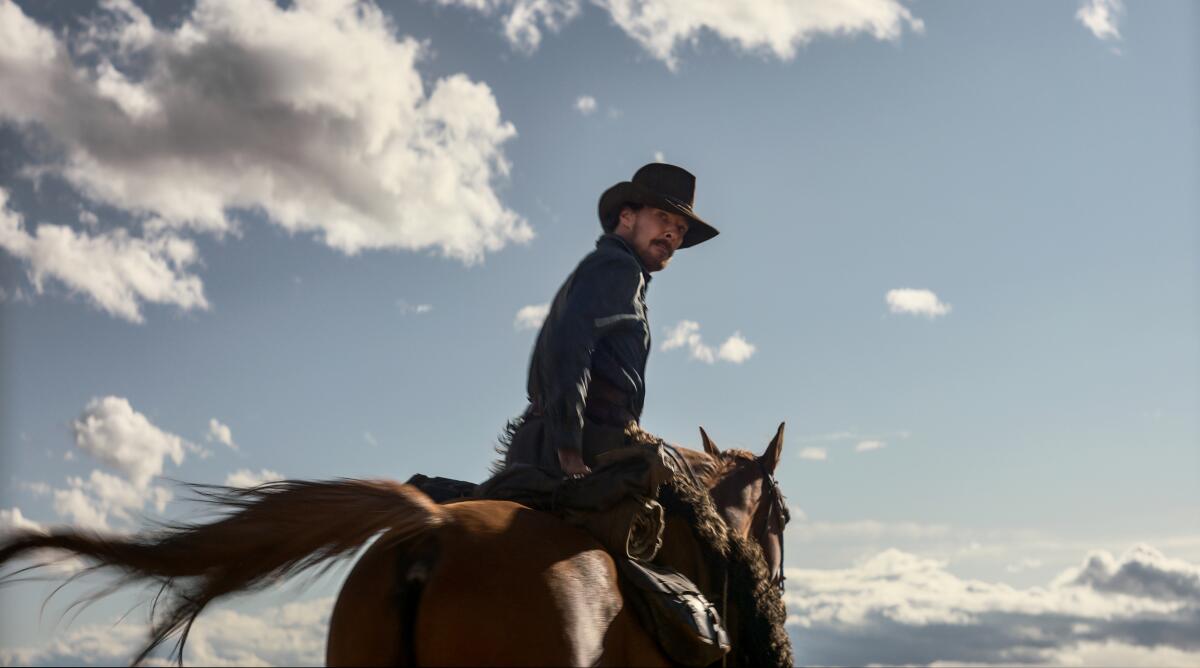Review: Willie Mays swings away on HBO Max, and Cartoon Saloon’s fifth feature lands on Netflix

- Share via
‘Say Hey, Willie Mays!’
Four years after Jackie Robinson broke major league baseball’s pernicious color barrier by taking the field with the Brooklyn Dodgers, Willie Mays joined the rival New York Giants and was immediately recognized as one of the game’s best players. Mays is still considered an all-timer — perhaps one of MLB’s top 10, ever — but as director Nelson George’s documentary “Say Hey, Willie Mays!” notes, his narrative wasn’t as dramatic as Robinson’s or Hank Aaron’s or other all-star Black players who challenged norms and paid a social cost for it. Mays faced racist invective throughout his career as he racked up numbers that put him in the same rarified realm as Aaron, Babe Ruth, Ted Williams and other legends. But compared to his Black peers, the Mays story was — outwardly, at least — less complicated, all about a universally beloved outfielder playing with infectious joy.
“Say Hey, Willie Mays!” isn’t a corrective to that story, necessarily. Mays really did play exuberantly and didn’t publicly stick his neck out in the way Aaron and others did when it came to civil rights. (Inside the clubhouse, it was a different story.) But this doc is a welcome reminder of how Mays’ very presence in American popular culture was a game-changer, given that only the most virulent of racists could deny his superiority to nearly everyone on the field. It’s also a gift to hear from Mays himself, still kicking at 91. He has long deserved a comprehensive bio-doc like this one. It’s something baseball fans will be watching long after the great man is gone.
“Say Hey, Willie Mays!’”TV-14, for adult content and language. 1 hour, 38 minutes. Available on HBO Max

‘My Father’s Dragon’
The Irish studio Cartoon Saloon has had a remarkable streak of Oscar success, with each of its first four movies — “The Secret of Kells,” “Song of the Sea,” “The Breadwinner” and “Wolfwalkers” — all scoring animated feature nominations. Its fifth feature, “My Father’s Dragon,” is based on Ruth Stiles Gannett’s beloved 1948 children’s novel and combines the colorful, geometrical designs of the book’s original illustrations (by the author’s stepmother, Ruth Chrisman Gannett) with the studio’s own kaleidoscopic approach to 2-D animation. The result is something visually dazzling and emotionally resonant, though likely to appeal primarily to youngsters and genre buffs.
Jacob Tremblay voices Elmer, the only son of a struggling small-business owner who has just moved both of them to the unfriendly big city. When the stress of living in poverty becomes too much, Elmer runs away, and through a string of circumstances finds himself stranded on Wild Island, which is populated by fierce talking animals and one imprisoned dragon, named Boris (Gaten Matarazzo). Elmer cuts Boris loose, only to learn the dragon was load-bearing — chained by a manipulative gorilla (Ian McShane) to keep the island from sinking.
The boy and the beast have a series of adventures on Wild Island, befriending other animals while trying to figure out a way to let Boris be free without hurting the land’s other inhabitants. It’s all very fanciful in a fairly simplistic way — aimed mainly at kids under 10. But parents should still connect to Elmer’s problems, which really all comes down to him learning what it’s like to be a grown-up: making tough decisions and hoping friends and family will be understanding.
“My Father’s Dragon.”PG, for some peril. 1 hour, 39 minutes. Available on Netflix; also playing theatrically, Bay Theatre, Pacific Palisades
‘Bar Fight!’
In writer-director Jim Mahoney’s raucous comedy “Bar Fight!,” Melissa Fumero and Luka Jones play Nina and Allen, a Los Angeles couple whose amicable separation gets thrown into turmoil when they both show up to hang out with friends at their favorite hipster bar on the same night. The staff likes the former couple, so they come up with a plan. Nina and Allen will play a series of silly games — like blindfolded darts, drunken tricycle racing and “human bowling” — to determine who gets 86ed from the bar.
This is Mahoney’s directorial debut, although he previously wrote, produced and starred in the similarly themed horror-comedy “Gatlopp,” in which a group of friends sort through their recent personal and professional setbacks by, yes, playing a game. As with that film, “Bar Fight!” never makes its lead characters’ problems especially compelling. (They’re just going through routine relationship and career drama.) Yet once again, Mahoney’s big gimmick proves useful, keeping the action moving while giving the actors a lot to do besides just drinking and talking.
Mahoney works well with his talented cast of comic actors — including Rachel Bloom and Julian Gant as the ex-couple’s bickering best friends, and Shontae Saldana and Hope Lauren as likable bartenders. He has a knack too for developing distinctive and varied characters who mesh well together in snappily written and staged scenes. “Bar Fight!” is so low-stakes and small-scale that at times it feels more like a TV sitcom pilot than a film. But this would be a pilot worthy of a pickup.
“Bar Fight!”Not rated. 1 hour, 24 minutes. Available on AMC+ and VOD; also playing theatrically, Laemmle Glendale
‘Paradise City’
Ever since the announcement that Bruce Willis would be retiring from acting due to a medical condition that makes it difficult for him to process language, it’s been tougher to enjoy the dozens of movies he’s appeared in over the last few years. Nevertheless, longtime Willis fans will undoubtedly be intrigued by the Hawaiian-set action movie “Paradise City,” in which he plays a grizzled bounty hunter named Ian Swan opposite his old “Pulp Fiction” castmate John Travolta, who plays a shady wheeler-dealer named Buck. And the good news here is that unlike a lot of their recent bait-and-switch vehicles — where the guys on the poster are only in a scene or two — both Willis and Travolta do get a fair amount of screen-time, separately and together.
The bad news is that while Travolta has some entertaining scenery-chewing moments, Willis remains as flat as he’s been in nearly all of the films he’s made since his health started to decline. The sight of him does inspire some pangs of nostalgia; but it’s not enough to add depth to what is ultimately a fairly generic shoot-em-up, primarily about Swan’s son (Blake Jenner) working with a local cop (Praya Lundberg) and his dad’s roguish ex-partner (Stephen Dorff) to get to the bottom of Buck’s malfeasance. This is TV-cop-show-level stuff, shot in some of Hawaii’s least scenic locations. The stars can’t save it.
‘“Paradise City.’”R, for violence and language. 1 hour, 32 minutes. Available on VOD; also playing theatrically, Laemmle Noho 7, North Hollywood
‘Mandrake’
Northern Irish folk-horror merges with the grim European police procedural genre in “Mandrake,” a pitch-dark tale of witchcraft and murder from director Lynne Davison and screenwriter Matt Harvey. Deirdre Mullins plays Cathy Madden, a parole officer assigned to check on “Bloody” Mary (Derbhle Crotty), a hermit convicted of murdering her husband and suspected of even more nefarious occult activity. Before long, Mary is dragging Cathy into her earthy rituals — perhaps because the officer herself is a lonely woman, increasingly distant from her ex-husband and young son. Davison and Harvey sprinkle strong jolts of terror into a story that is otherwise deliberately ambiguous, relying on deep-seated dread and maternal anxiety to ratchet up the tension even when not much else is happening. The result is a fairly cerebral genre hybrid that still connects on a gut level.
“Mandrake.” Not rated. 1 hour, 25 minutes. Available on Shudder
‘Capturing the Killer Nurse’
A companion piece to Netflix’s recent movie “The Good Nurse,” the documentary “Capturing the Killer Nurse” tells the same story via direct-to-camera testimonials from the real people involved, supplemented by dramatic reenactments and some audio and images from the original case files. While “The Good Nurse” examines the larger social and personal problems that allowed serial killer Charles Cullen to murder dozens of patients in multiple hospitals — frequently arousing suspicions without getting arrested — Tim Travers Hawkins’ doc is more conventional true-crime fare, laying out the facts in clinical detail. Anyone gripped by “The Good Nurse” won’t be surprised to learn that the film followed what actually happened pretty closely. But whether dramatized or presented as journalism, it remains shocking to hear how the problem of Cullen kept getting passed from one institution to another.
“Capturing the Killer Nurse.” TV-14 for language and mature themes. 1 hour, 34 minutes. Available on Netflix
Also on VOD
“All Jacked Up and Full of Worms” is a psychedelic horror film targeting viewers willing to take the same kind of trip as the movie’s characters: an assortment of young weirdos who explore the limits of their consciousness and their bodies by ingesting hallucinogenic earthworms. Writer-director Alex Phillips and his cast aren’t telling a story so much as staging a succession of surreal sketches, each veering wildly between the sensual and the disturbing. Available on Screambox and VOD
Available now on DVD and Blu-ray

“The Power of the Dog” joins the Criterion Collection in a spiffy-looking edition that adds interviews and conversations with the cast and crew. One of last year’s best films, writer-director Jane Campion’s adaptation of Thomas Savage’s 1967 novel is a sly, poetic neo-western, featuring a career-peak performance from Benedict Cumberbatch as a swaggering 1920s Montana rancher whose rigid ideas about strength and individualism make life miserable for his gentle brother (Jesse Plemons), his brother’s skittish new wife (Kirsten Dunst) and the wife’s studious teenage son (Kodi Smit-McPhee). Criterion
More to Read
Only good movies
Get the Indie Focus newsletter, Mark Olsen's weekly guide to the world of cinema.
You may occasionally receive promotional content from the Los Angeles Times.










